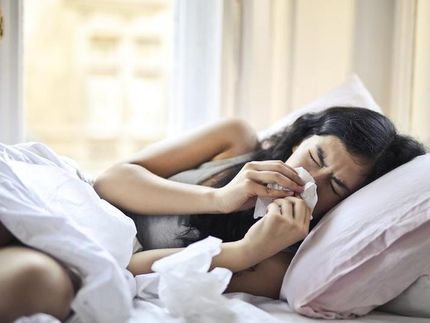New vaccine technique effectively fights breast cancer in mice
A new vaccine technique can fight a certain type of breast cancer in mice. So-called HER2-positive breast cancer accounts for between 20 and 30 per cent of all cases of breast cancer in humans. Researchers from the University of Copenhagen and the University of Bologna now show that the same type of cancer can be fought in mice with help of their new vaccine.
In cases of breast cancer, the immune system has difficulties distinguishing between cancer cells and healthy cells. Therefore, it normally does not launch a protective immune response that can prevent cancer cells from growing and spreading. But the research group at the University of Copenhagen is able to change that by adding an antigen which is normally expressed on the cancer cells onto the surface of a virus-like particle. They thus inject the particle into the bodies of the mice.
'Our virus-like particle with the added cancer antigen makes the body believe it is under attack. This makes the immune system produce large amounts of antibodies targeted at the cancer antigen, which then fights the cancer cells in the mice', says Associate Professor and author of the study Adam F. Sander from the Department of Immunology and Microbiology.
In the study the researchers have documented the beneficial effect of their vaccine technique in several ways. Because their vaccine both has a preventive effect and works when cancer has already developed.
They have given the vaccine to two different groups of mice genetically coded to spontaneously develop two different types of breast cancer. In one group only half of the mice developed cancer, which was characterised by significantly fewer and smaller tumours than usual. In the second group none of the vaccinated mice developed cancer.
Depending on the genetic variation in the mice the vaccine thus prevented breast cancer from developing in 50-100 per cent of the cases.
In addition, the researchers examined the vaccine's effect on two groups of mice already suffering from cancer. They had either been injected with fragments of a tumour or human cancer cells.
The vaccine cured 80 per cent of the mice with tumour fragments. In the group with human cancer cells all of the mice developed cancer, but at a much slower pace than usual.
The researchers also took blood from the mice that produced the relevant antibodies and tested it on human cancer cells. Here too the effect was hard to miss. All the human cancer cells bound to the antibodies in the right way.
The present treatment of HER2-positive breast cancer involves administering large amounts of antibodies fighting the cancer over a long period of time. The treatment is expensive and has side effects, and the immune system may become intolerant to the antibodies, which eventually have no effect. The researchers believe their vaccine by comparison will cost markedly less if its effect translates to humans.
'What is exciting about our treatment technique is that it makes the body do the work. We do not inject foreign antibodies, but leave it to the body to produce them', says Postdoc and author of the study Susan Thrane.
The Danish research group behind the study is headed by Associate Professor Adam F. Sander, who last year helped establish the spinout NextGen Vaccines Aps based on their research into vaccine techniques. This summer they established a joint venture company named AdaptVac Aps together with the company ExpreS2ion.
This study is one of the first large results of this collaboration, and the researchers hope they will be able to go on to conducting clinical trials on humans before long.
Original publication
Other news from the department science
Most read news
More news from our other portals
See the theme worlds for related content
Topic world Antibodies
Antibodies are specialized molecules of our immune system that can specifically recognize and neutralize pathogens or foreign substances. Antibody research in biotech and pharma has recognized this natural defense potential and is working intensively to make it therapeutically useful. From monoclonal antibodies used against cancer or autoimmune diseases to antibody-drug conjugates that specifically transport drugs to disease cells - the possibilities are enormous

Topic world Antibodies
Antibodies are specialized molecules of our immune system that can specifically recognize and neutralize pathogens or foreign substances. Antibody research in biotech and pharma has recognized this natural defense potential and is working intensively to make it therapeutically useful. From monoclonal antibodies used against cancer or autoimmune diseases to antibody-drug conjugates that specifically transport drugs to disease cells - the possibilities are enormous





















































